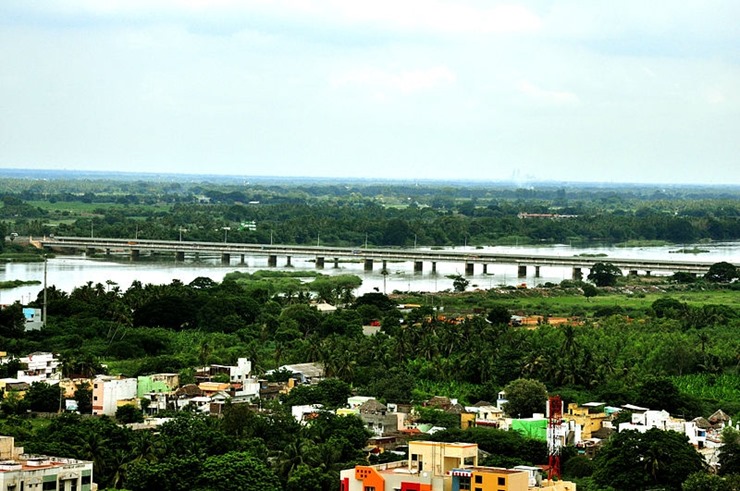
The Cauvery dispute is the most intractable of all the river water disputes, did you say? Think again.
The two main disputing states, Tamil Nadu and Karnataka found themselves on the same page in the Supreme Court before a three-Judge bench yesterday afternoon, when they submitted that there was no Constitutional bar on the court’s hearing of their Civil Appeals against the Final Order of the Cauvery Water Disputes Tribunal.
The bench comprised of justices Dipak Misra, Amitava Roy, and AM Khanwilkar.
Kerala, another party to the dispute, also supported the stand of these two States.
The Centre and the Union Territory of Puducherry, however, maintained that because of the Constitutional bar, through Article 262, the Supreme Court has no jurisdiction to hear the Civil Appeals against the Final Order of the Tribunal.
Justice Dipak Misra told Tamil Nadu’s counsel, Shekhar Naphade that today is the special day, as both the States at least agree on the question of maintainability of their Civil Appeals. Justice Misra added that Naphade, therefore, could adopt the arguments advanced by Karnataka’s senior counsel, Fali S Nariman, and use the limited time, only to make additional submissions, if any.
Taking the cue, Naphade went one step ahead of Nariman, who first argued in defence of maintainability of the civil appeals.
Naphade surprised the bench that as Article 262 only enables Parliament to restrict the Supreme Court or any other court from adjudicating disputes or complaints with regard to use, distribution or control of inter-state river, it cannot be a bar because there is no dispute.
?Both for Naphade and Nariman, as well as for Kerala’s counsel, it was necessary to come together, and take a common stand on the issue of maintainability, in order that their pending Civil Appeals against the Final Order of the Tribunal are heard by the Supreme Court?. For if the bench accepts the AG’s argument, it would mean these States have no option, but to go to the Tribunal again for resolving their differences, a prospect which they wanted to avoid.
Puducherry, however, adopted the Centre’s stand, as it had nothing to lose if the Tribunal’s final order is executed, because of its lowest share of the Cauvery water.
Background
Parliament enacted the Inter State Water Disputes Act in 1956, under Article 262, and specifically [https://indiankanoon.org/doc/80709/provided] for ousting Supreme Court’s or any other court’s jurisdiction in adjudicating the river water disputes, once they are referred to a Tribunal.
?It was because the Tribunal’s orders had the “force” of the decrees of the Supreme Court, in order to make them executable.
As Article 262 was in the original Constitution, the framers wanted it that way because they felt that the solution to the inter-state river water disputes must be found expeditiously, and if appeals are allowed, they would become intractable. ? That was the AG’s argument, who suggested that Article 262 is the only provision in the Constitution which ousted even the Supreme Court’s judicial review, explicitly. As the SC’s jurisdiction under Articles 131 and 32 already stood ousted by virtue of Article 262, and as held by previous benches of the court, this bench cannot keep Article 136, enabling hearing of Civil Appeals, on a pedestal higher than Articles 131 and 32, which are equally weighty provisions, he said.
Tamil Nadu’s strange stance
Naphade claimed that with the Cauvery Water Disputes Tribunal delivering its Final Order in 2007, the dispute ‘merged’ with the Order, and thereafter, it was the order which was appealed against in the Supreme Court and the dispute no longer survived.
Attractive though Naphade’s contention was, the AG, Mukul Rohatgi, found it too vulnerable when he suggested that a dispute, although it merges with the Final Award of the Tribunal, stands revived, when appealed against in the Supreme Court. Therefore, it is not correct to say that the dispute did not survive, so as to attract the bar of Article 262, he said.
?And a tangential discussion on the meaning of “out of"?
Another highlight of yesterday’s hearing was a brief discussion on the meaning of the phrase “out of”, with Naphade and Justice Dipak Misra disagreeing on what it means. The phrase was picked up by Justice Misra, who went on a tangent, when Nariman was referring to its use in one of Mulla’s commentaries.
When Justice Misra said a child born out of wedlock, has to be a legitimate child, Naphade disagreed, saying, for example, that Tamil Nadu does not get anything legitimate out of Cauvery, making everyone laugh in the courtroom.
Finding the discussion on “out of” taking more time than justified, and with another matter on Uttarakhand defection waiting in the queue to be heard, Justice Misra soon put it to rest, saying it could be discussed later.
The bench later reserved its verdict on the maintainability of the civil appeals filed by Karnataka, Tamil Nadu and Kerala against the Cauvery Tribunal’s 2007 Final Order.